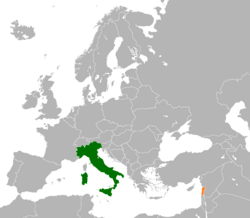Italy–Lebanon relations
 From Wikipedia - Reading time: 7 min
From Wikipedia - Reading time: 7 min
 | |
Italy |
Lebanon |
|---|---|

Italy–Lebanon relations (Italian: relazioni bilaterali tra Italia e Libano, Arabic: العلاقات الإيطالية اللبنانية) are relations between Italy and Lebanon. Both countries are members of the Union for the Mediterranean. Italy considers Hezbollah, a major force in Lebanon a terrorist organisation.[1]
History
[edit]In 64 B.C., the Roman general Pompey added Lebanon to the Roman Republic.[citation needed] During and before this time, Phoenicians and Romans exchanged knowledge, habits, and customs.[citation needed]
Lebanon opened a legation in 1946, which was transformed into an embassy in 1955.[citation needed] Both countries signed a Treaty of Friendship, Cooperation and Navigation in 1949.[citation needed] The Italian Cultural Institute of Beirut (Istituto Italiano di Cultura di Beirut) is located on the ground floor of the Embassy in the suburb of Baabda.[2]
Official visits
[edit]In April 2014, Italian Defense Minister Roberta Pinotti visited Lebanese President Michel Sleiman and Prime Minister Tammam Salam to discuss international support for the Lebanese Armed Forces.[3]
Economic relations
[edit]In 2019, the volume of trade between Italy and Lebanon amounted to $1.35 billion, with Italy exporting $1.31 billion worth of goods to Lebanon and Lebanon exporting $39.8 million worth of goods to Italy.[4]
Italy's main export to Lebanon is refined oil (41.5%), with jewellery (5.01%) and eyewear (1.98%) also among the most-exported products from Italy. Lebanon's main export to Italy are scrap copper (24.8%) and phosphoric acid (24.5%), with other notable exports being gold (6.76%) and scrap aluminium (5.85%).[4]
Italian aid to Lebanon
[edit]The Italian Government supported the reconstruction of Lebanon after the Taef Agreement.[citation needed]
In December 2013, the Italian Government announced increased funding to Lebanon to assist Lebanon in dealing with refugees fleeing the Syrian Civil War. Italy also announced a rescue mission with five to seven ships to rescue thousands of migrants, mostly Syrians, in the Mediterranean Sea.[5]
In 2023, Italy reaffirmed its commitment to ensuring stability in Lebanon and descalating conflict in Lebanon which had led to an increase in migration from Lebanon to Europe.[6]
Resident diplomatic missions
[edit]See also
[edit]- Foreign relations of Italy
- Iranian influence in Lebanon
- Foreign relations of Lebanon
- Italians in Lebanon
Bibliography
[edit]- Giampaolo Conte: Economic Relationship between Italy and Lebanon in the Fifties, in: "Oriente Moderno", v. 94, issue 1, pp 99–112.
References
[edit]- ^ https://www.terrorism-info.org.il/en/more-countries-have-recently-declared-all-of-hezbollah-a-terrorist-organization-but-some-eu-countries-still-refrain-from-doing-so/
- ^ "Beirut is all things to all people". The National. 19 November 2011. Retrieved 11 March 2022.
- ^ "Italian defense minister discusses Army assistance with officials". The Daily Star.
- ^ a b "Italy (ITA) and Lebanon (LBN) Trade | OEC". OEC - The Observatory of Economic Complexity. Retrieved 11 March 2022.
- ^ "Italy to support Lebanese Army, increase refugee aid". The Daily Star.
- ^ "Italy's Meloni reaffirms commitment to Lebanon's stability". www.aa.com.tr. Retrieved 28 December 2023.
External links
[edit]- Lebanese Embassy in Italy (in Italian)
 KSF
KSF
